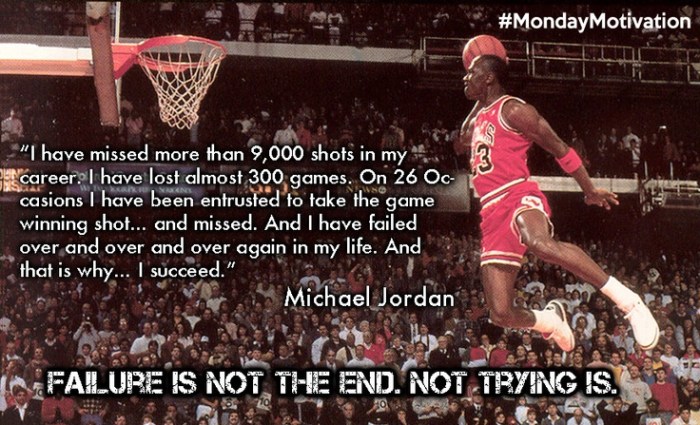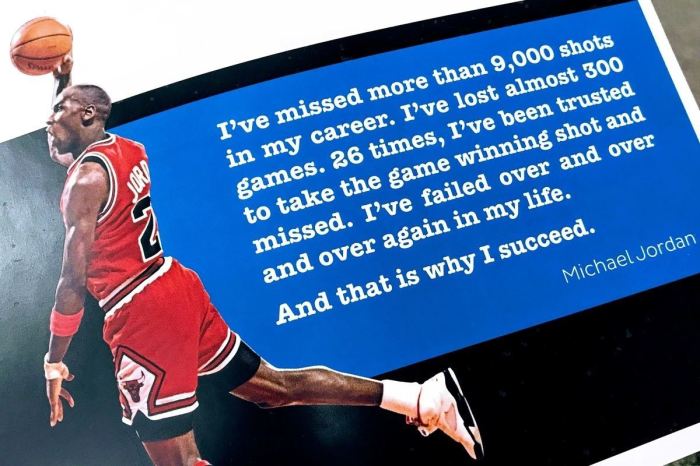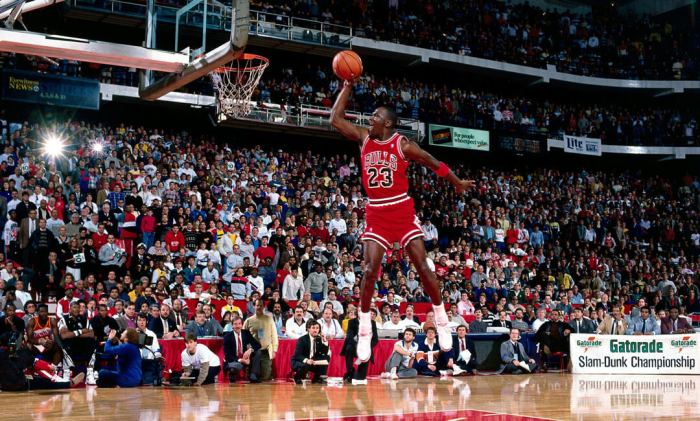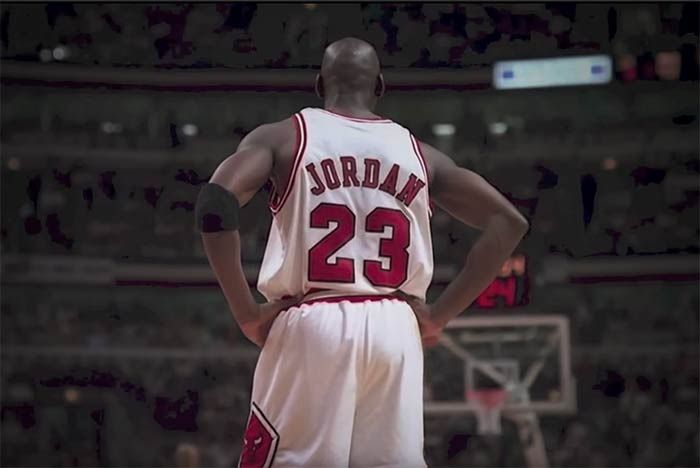Michael jordan a profile in failure – Michael Jordan, a name synonymous with basketball excellence, is often hailed as the greatest player of all time. However, beyond the accolades and iconic status lies a lesser-known narrative: Michael Jordan, a profile in failure. This exploration delves into the setbacks, challenges, and lessons learned that shaped the legendary athlete, revealing a nuanced and multifaceted portrait of one of sports’ most iconic figures.
Early Life and Basketball Beginnings: Michael Jordan A Profile In Failure
Michael Jeffrey Jordan was born on February 17, 1963, in Brooklyn, New York. He was the fourth of five children born to James R. Jordan Sr. and Deloris Peoples Jordan. Jordan’s father was an equipment supervisor for General Electric, and his mother was a bank teller.
The family moved to Wilmington, North Carolina, when Jordan was a toddler.
Jordan began playing basketball at a young age. He was a natural athlete, and he quickly developed a passion for the game. Jordan played on his high school team, and he was named the North Carolina Player of the Year in 1981. He was also recruited by several top college basketball programs.
Recruitment to University of North Carolina
Jordan ultimately decided to attend the University of North Carolina at Chapel Hill. He played for the Tar Heels for three seasons, and he helped lead the team to the NCAA championship in 1982. Jordan was named the NCAA Tournament Most Outstanding Player that year.
College Career at North Carolina

Michael Jordan’s college basketball career at the University of North Carolina was a period of exceptional individual and team success. He enrolled in 1981 and quickly established himself as a standout player under the guidance of legendary coach Dean Smith.During
his freshman year, Jordan made an immediate impact, averaging 13.4 points per game and helping the Tar Heels reach the Final Four of the NCAA Tournament. In his sophomore season, he emerged as a national star, leading the team in scoring (20.0 ppg) and earning First Team All-American honors.
1982 NCAA Championship
The highlight of Jordan’s college career came in 1982 when he led the Tar Heels to the NCAA Championship. In the championship game against Georgetown, Jordan hit the game-winning shot with just 17 seconds remaining, securing a 63-62 victory and cementing his status as a college basketball legend.
Leadership and Competitive Spirit
Throughout his college career, Jordan displayed exceptional leadership skills and a fierce competitive spirit. He was known for his relentless work ethic, demanding the best from himself and his teammates. Jordan’s competitive drive pushed him to excel in every aspect of the game, from scoring to rebounding to defense.
NBA Draft and Early Professional Career

Michael Jordan was selected third overall by the Chicago Bulls in the 1984 NBA Draft. Despite his impressive college career, Jordan initially struggled in the NBA, averaging only 28.2 points per game in his rookie season. However, he gradually improved his game, increasing his scoring average to 37.1 points per game in his second season and leading the Bulls to their first playoff appearance since 1980.
Early Impact on the Bulls
Jordan’s impact on the Bulls was immediate. He brought a new level of excitement and energy to the team, and his scoring prowess helped them become one of the most feared offensive teams in the league. In his first three seasons, Jordan led the Bulls to three consecutive playoff appearances, including a berth in the Eastern Conference Finals in 1988.
Rise to Superstardom

Michael Jordan’s rise to superstardom in the NBA was a meteoric ascent fueled by his extraordinary athleticism, unparalleled skills, and unwavering determination. His signature moves, such as the “Air Jordan” and the “Fadeaway,” became synonymous with his dominance on the court.
Jordan’s impact on the popularity of basketball was profound. He transformed the game into a global phenomenon, captivating audiences with his breathtaking performances and electrifying style of play. His global recognition extended far beyond the basketball court, as he became a cultural icon and a household name around the world.
Signature Moves
Jordan’s “Air Jordan” was a gravity-defying dunk that showcased his incredible vertical leap and hang time. The move became an iconic symbol of his dominance and athleticism.
The “Fadeaway” was a mid-range shot that Jordan perfected. It allowed him to create space from defenders and shoot over them with ease, making it virtually impossible to block.
Global Recognition, Michael jordan a profile in failure
Jordan’s fame extended far beyond the United States. He became a global ambassador for basketball, inspiring countless young players around the world. His signature sneakers, the Air Jordan, became a symbol of style and athleticism, and they remain highly sought after today.
Jordan’s global recognition was further solidified by his involvement in various media projects, including the iconic “Space Jam” film and the “Air Jordan” commercials. These projects introduced him to a wider audience and cemented his status as a cultural icon.
Chicago Bulls Dynasty

In the 1990s, the Chicago Bulls established a dynasty that dominated the NBA, with Michael Jordan as its centerpiece. Led by Jordan’s exceptional leadership and the team’s unparalleled chemistry, the Bulls won six NBA Championships in an eight-year span, solidifying their status as one of the greatest teams in basketball history.
The Six NBA Championships
The Bulls’ dynasty began with their first NBA Championship in 1991, defeating the Los Angeles Lakers in five games. They followed this triumph with four consecutive championships from 1996 to 1998, known as their “second three-peat.” After Jordan’s brief retirement, the Bulls reunited for another three-peat from 1996 to 1998, further cementing their legacy as the dominant force in the NBA.
Jordan’s Individual Accomplishments
During the Bulls’ dynasty, Jordan emerged as one of the greatest players of all time. He won six NBA Finals MVP awards, matching the number of championships he earned. Jordan also claimed five NBA MVP awards, solidifying his status as the league’s most dominant player.
His individual accolades, coupled with the team’s collective success, made him an iconic figure in basketball and beyond.
Factors Contributing to the Bulls’ Success
Several factors contributed to the Bulls’ remarkable success during this period:
- Jordan’s Leadership:Jordan’s exceptional leadership and competitive drive were instrumental in the team’s achievements. His ability to inspire and motivate his teammates, along with his unwavering determination, played a crucial role in their success.
- Team Chemistry:The Bulls possessed an unparalleled team chemistry, fostered by a shared commitment to winning and a deep respect for each other’s abilities. The team’s cohesive unit, both on and off the court, allowed them to overcome adversity and achieve sustained success.
- Phil Jackson’s Coaching:Phil Jackson’s innovative coaching style and his ability to connect with players were key factors in the Bulls’ dynasty. His implementation of the triangle offense, which emphasized teamwork and ball movement, perfectly suited the team’s strengths and maximized their potential.
Retirement and Legacy

Michael Jordan’s retirement from basketball in 1993 shocked the world. At the peak of his powers, he left the game to pursue a career in baseball. While his baseball career was unsuccessful, he returned to basketball in 1995 and led the Chicago Bulls to three more NBA championships.
Post-Retirement Ventures
After retiring from basketball for the second time in 1998, Jordan became a successful businessman. He is the owner of the Charlotte Hornets and has been involved in various other ventures, including endorsements, golf course design, and film production.
Legacy
Michael Jordan is widely considered one of the greatest basketball players of all time. He is a six-time NBA champion, six-time NBA Finals MVP, five-time NBA MVP, and ten-time NBA All-Star. He led the Chicago Bulls to six NBA championships in eight years and is credited with popularizing the game of basketball around the world.
FAQ Resource
What were some of Michael Jordan’s early struggles in the NBA?
Jordan initially faced criticism for his lack of defense and ball-handling skills.
How did Jordan overcome his early failures?
Through relentless practice, determination, and a relentless pursuit of improvement.
What lessons can be learned from Michael Jordan’s failures?
Failure can be a catalyst for growth, resilience, and ultimate success.